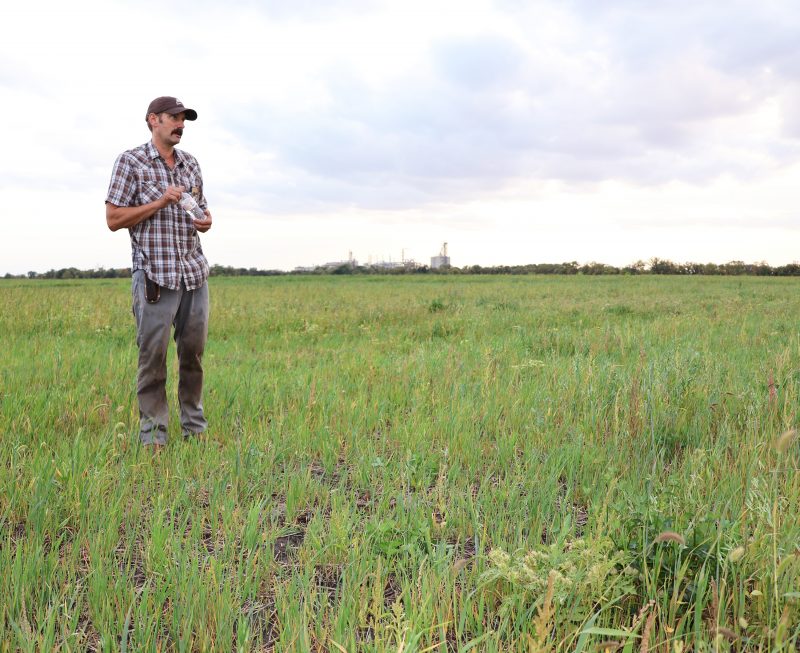Note: This is the 12th installment in the 12-part “A Sense of Where You Are” series.
In case Allen and Kathleen Deutz need a reminder of one of the main reasons corn dominates the landscape in their part of southwestern Minnesota, they need to look no further than the massive Archer-Daniels-Midland ethanol plant that rises to the sky just across one of their fields. Here’s their context: that plant has been gobbling up corn in the region since the mid-1980s. As a result, fences have been taken down, pastures and hay ground plowed up, and livestock pretty much removed from the land.

“It changed the landscape,” said Allen one evening recently, gesturing toward the biofuel plant across the Redwood River.
The Deutzes farm some 800 acres in Lyon County. They do raise corn, and yes, much of it goes to that ADM plant. But as farmers from throughout the region haul corn past the Deutz place — Allen jokes that “every farmer in four counties drives by my farm at some point” — they can’t help but notice a different look to this particular farm’s landscape: there are small grains such as wheat, well-kept fences, and forages — and animals out there grazing those forages.
Literally in biofuel’s massive shadow, the Deutzes are going against the grain. About half the acres that make up Redwood River Farms produce crops for the organic market. They have a cow-calf beef herd, as well as a flock of hair sheep. Goats and hogs are also part of the mix, and the couple direct-markets meat to area eaters. All those animals are raised on rotationally grazed perennials and summer annuals. They also graze a local Minnesota Department of Natural Resources wildlife area. The Deutzes dairy farmed until they sold the herd in 2016, and re-integrating animals onto the farm hasn’t been easy. For one thing, they had to set up miles of fencing, which they were able to do with the help of the NRCS’s EQIP program.
At first glance, not taking full advantage of a handy local market for a crop that grows well on this land may not seem to make sense. But the Deutzes have some good, commonsense reasons for not going whole hog into growing corn for biofuels. Allen has a master’s degree in economics and teaches ag business at Southwest Minnesota State University in Marshall, so he knows how to crunch the numbers and do financial projections. He sees livestock as a way to diversify the farm’s income stream while providing a kind of insurance policy that fortifies the farm against crop failures — something that’s become particularly critical in recent years as climate change cooks up extreme weather events on a regular basis.
For example, during a September field day sponsored by the Sustainable Farming Association and the Department of Natural Resources, Allen explained how a drought in 2023 devastated a corn crop he had planted. However, after checking with his insurance agent, he was able to bring cattle onto the fenced field and graze it. That not only produced some economic value from the ruined crop while controlling weeds, but built soil fertility for the next growing season, when he planted organic wheat on the field. That wheat was his most profitable crop in 2024. The Deutzes knew that the drought-stricken field probably got some second looks from farmers driving to the ethanol plant, but over the long-term, it’s turned out to be a success.
“It didn’t look good, but I knew that failed corn field made sense economically,” Allen said while standing at the edge of the 40-acre plot. “I’m not stuck in a rut of always having to make money from having corn and soybeans in my rotation. The livestock and fencing system gives us options, and with the erratic weather systems we have now, it provides some resilience.”
At one point, the Deutzes took the field day participants to a 170-acre parcel north of the farmstead. Allen explained how this “summer pasture,” which was made up of wheat, oats, barley, field peas, common vetch, and buckwheat, would be grazed. In 2025, organic corn will be planted in the resulting nutrient-rich soil.
As the sun set, the lights of the ADM plant twinkled at the edge of the field. Biofuel was being distilled above the ground. Biology was being built beneath it.
Brian DeVore edits the Land Stewardship Letter and produces the Ear to the Ground podcast.
Give it a Listen
- Ear to the Ground 357: Against the Grain (Allen Deutz)
Installments in the ‘A Sense of Where You Are’ Series:
- Introduction to the Series: A Sense of Where You Are
- Red Dresses & Magic Management
- In the Blood
- Seeking Signs of Life
- Forest for the Trees
- The Quickening
- Food Bank Booster
- First Things First
- The Big Picture
- The Snowball Effect
- 7 Years Later
- Against the Grain